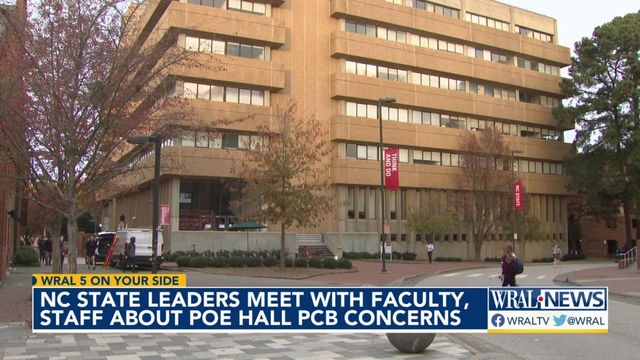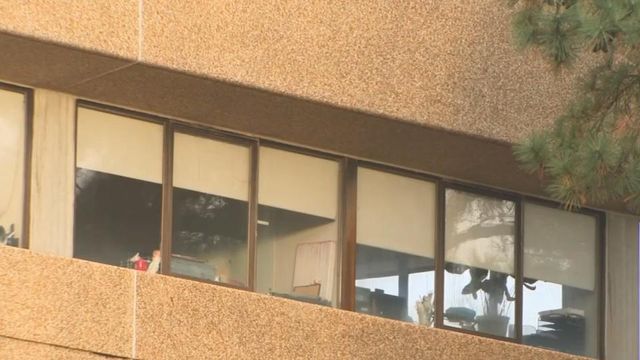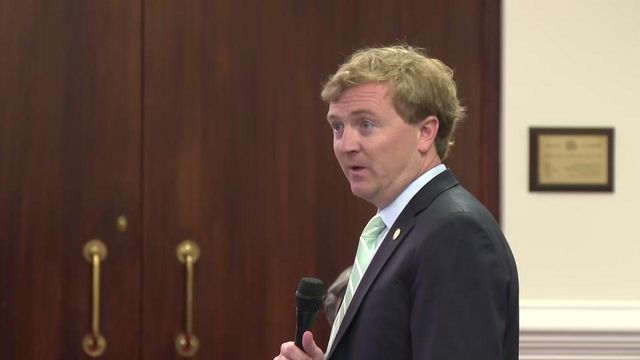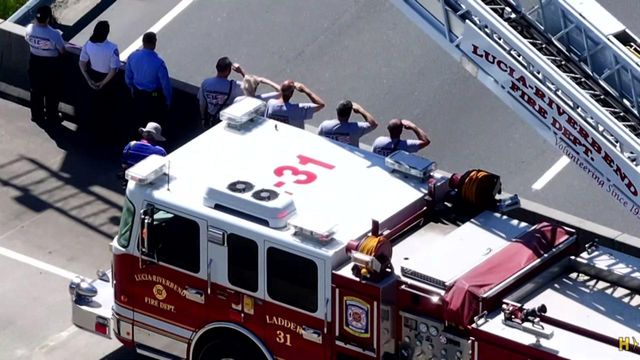'A disaster': Faculty, staff members seek answers after NC State closes Poe Hall
North Carolina State University leaders held a meeting Tuesday to discuss concerns about cancer-causing toxic chemicals inside Poe Hall, the education building on the university’s campus.
About 125 of the 200 faculty and staff members who worked inside the hall attended the virtual meeting.
The meeting came after the university began to close Poe Hall on Friday. Testing inside the seven-story concrete building found PCB, toxic chemicals known to cause cancer and other health issues.
Education professor Stephen Porter, who has worked inside Poe Hall for years, told WRAL 5 On Your Side that university leaders seemed more focused on staff and faculty continuing to work during the closure rather than health issues.
“I thought the meeting was a disaster, and I think it illustrated how tone deaf the administration is,” Porter said. “They tried to keep the conversation completely focused on mission continuity.
Porter said university leaders would not answer questions about health, only work.
“They didn’t want to answer any of the dozens of questions that were blowing up in the chat about health-related concerns because everyone is asking the same question, ‘Are we going to be ok?’” Porter said.
Porter said his wife has asked him if he’s going to be ok and asked him what he’s been exposed to.
Records obtained by WRAL 5 On Your Side reveal university leaders were aware of cancer-causing toxic chemicals inside Poe Hall for more than a month and a half before deciding to evacuate the building.
“The biggest question that blew up in chat was, [what] are the materials [that are] safe to bring into our home?” Porter said. “It’s a very reasonable question … According to your reports, the university has known about this for at least six weeks, you’d think they’d have an answer.”
Porter claimed NC State Emergency Preparedness and Strategic Initiatives senior director Amy Orders and College of Education Dean Paola Sztajn refused to answer the question.
“They know it’s not perfectly safe, so they’re taking the cowardly route,” Porter said.
WRAL 5 On Your Side reached out to Orders and Sztajn with a request for comment but have yet to hear back.
"The university has encouraged occupants of the building to take what they need to successfully finish the semester," Orders wrote in an email. "If individuals have health concerns, they're encouraged to speak with their physician or, if a student, with Campus Health."
WRAL 5 On Your Side is still waiting to hear back from Sztajn.
“It would be really useful if the chancellor [Dr. Randy Woodson] and dean could simply come out, and tell faculty who have offices in Poe, ‘Is it safe for us to bring all the stuff for our teaching research into our homes?’” Porter said. “I couldn’t believe they had not prepared an answer that question.”
NC State Chancellor Dr. Randy Woodson releases statement
On Tuesday, Woodson released a letter to the NC State community.
“Last week, the university made the decision to temporarily close Poe Hall,” Woodson wrote. “We took this voluntary step out of extreme caution after conducting preliminary testing in response to occupant concerns raised earlier this semester. Test results came back suggesting environmental contaminants (PCBs), necessitating further study.
“Our first priority is the well-being of those who work, teach and learn in the building and preserving academic continuity while we thoroughly investigate environmental conditions. Classes and scheduled events in Poe Hall will be moved to virtual formats or alternative locations for the remainder of the fall semester, and accommodations are currently underway to either move faculty and staff to other offices or allow for hybrid work.
“Closing the building in the midst of a semester is far from ideal, and we understand that this situation has caused concern beyond those who are directly impacted. I want to emphasize that we work year-round to maintain and improve our physical spaces on campus, and to address any concerns. We will continue to do all we can to ensure that our university is a safe place to work and learn.
“As we move forward with more comprehensive testing in Poe Hall, we’ll work collaboratively with campus partners to ensure continuity and consult experts to help us gain complete understanding of the building’s environment. We’ll also communicate progress and pertinent updates with individuals who are impacted by the closure.”
Woodson also wrote that anyone with concerns about Poe Hall can call 919-513-3358 or email ncstateemmc@ncsu.edu.
AAUP sends letter to Chancellor Dr. Randy Woodson
History professor David Ambaras, who serves as the president of NC State’s chapter of the American Association of University Professors [AAUP], called the situation “quite horrific.”
“We don’t know for sure that PCBs have caused the different illnesses and that isn’t absolutely established, but nonetheless, there is a great concern about the incidences of illness in the building that should be spoken to,” Ambaras said.
Ambaras wrote a letter to Woodson asking several questions, including:
- What triggered the testing in Poe Hall in October?
- What is the basis for WRAL News’ reporting of long-standing occupant concerns about conditions in Poe Hall that were ignored?
- When will the university publicly release testing results?
Ambaras said the AAUP has yet to receive a response to his letter from Woodson or anyone with NC State.












